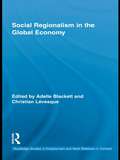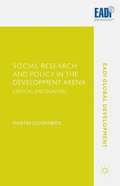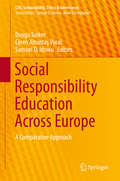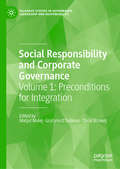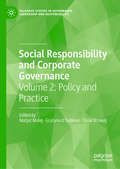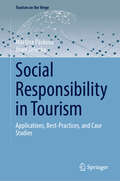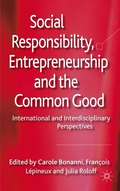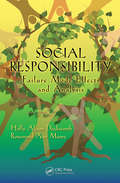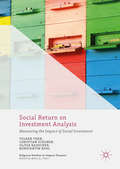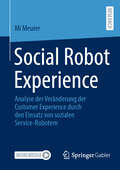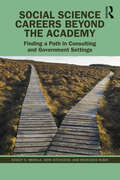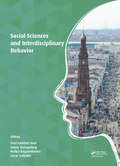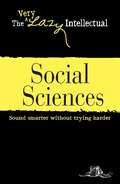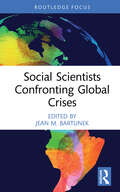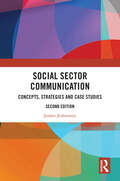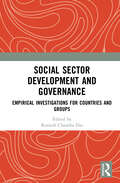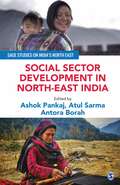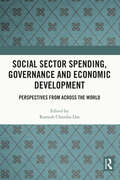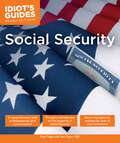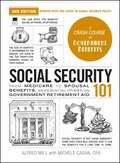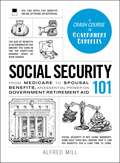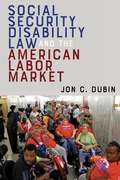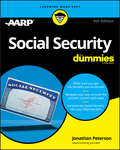- Table View
- List View
Social Regionalism in the Global Economy (Routledge Studies in Employment and Work Relations in Context)
by Christian Lévesque Adelle BlackettRegional trade agreements have expanded exponentially over the past decade, and have become a significant, if controversial, factor in the expanse of economic globalization. Social Regionalism in the Global Economy attempts to take a fresh, interdisciplinary approach to addressing labour regulation by drawing upon insights from industrial relations, comparative capitalism, and new governance schools of thought. It stands for the proposition that an interdisciplinary study of regional regulation holds the potential to offer a fuller account of social regionalism. Its focus is to consider how institutions and labour market actors reconstruct and renegotiate regulatory space in a changing economic environment characterized by regional impulses. It argues that there is a dynamic interplay between institutions and actors of social regulation. This interplay occurs at many levels. The book therefore maps both how actors shape institutions as well as how institutions shape social actors’ ability to affect regulatory processes. The editors bring together leading international specialists willing to move beyond textual analyses of regional agreements to offer alternative accounts of regional integration. The work emphasizes that institutional context and social actors at multiple governance levels are integral to the progressive construction and regulation of regional space. It further contributes to the literature by combining insights from overlooked regional entities in transition and developing countries with original analyses from the European Union and the NAFTA. These aims will be achieved by combining original research that is empirically grounded with theoretically informed analysis.
Social Research and Policy in the Development Arena: Critical Encounters (EADI Global Development)
by Martin DoornbosThe author focuses on the research-policy nexus in development studies, highlighting reciprocal orientations and interactions between the domains of social research and of policy and politics. He looks at instances where these domains are complementary and geared towards common objectives, but also with others marked by opposing rationales.
Social Responsibility Education Across Europe
by Samuel O. Idowu Duygu Turker Ceren Altuntaş VuralThis book provides a comprehensive and multi-facettedanalysis of the current state of social-responsibility education in various Europeancountries. It explores the different approaches toward CSR education acrossEurope by identifying each country's current practices and university courses,and by revealing the effect of these methods on future generations of leaders. Usinga quantitative research methodology, the book presents comparisons of thecurrent nature and implications of CSR education in a sample of 10 businessschools from Germany, Greece, Hungary, Italy, Latvia, Poland, the Netherlands,Portugal, Spain and Turkey.
Social Responsibility and Corporate Governance: Volume 1: Preconditions for Integration (Palgrave Studies in Governance, Leadership and Responsibility)
by Matjaž Mulej Grażyna O’Sullivan Tjaša ŠtrukeljThis book illustrates how CSR can be used as a tool to improve corporate governance in organizations and improve the relationship between business and society. Connecting corporate social responsibility (CSR) with corporate governance (CG) is a 21st century challenge, and the book argues that CSR and CG should be addressed together in synergy in the management literature. Linking these two crucial business functions, it describes the preconditions for successful integration and the tools for practical implementation. Volume 1 covers corporate governance from the perspective of CSR, where responsible and sustainable business is a common goal and the tasks are to create core values, business policy and organizational strategies.
Social Responsibility and Corporate Governance: Volume 2: Policy and Practice (Palgrave Studies in Governance, Leadership and Responsibility)
by Matjaž Mulej Grażyna O’Sullivan Tjaša ŠtrukeljConnecting Corporate Social Responsibility (CSR) with Corporate Governance (CG) is a 21st Century challenge. This edited volume illustrates that CSR can be used as a tool to improve Corporate Governance in organizations and improve the relationship between business and society. Moreover the book argues that they should be treated together in synergy in management literature. This two volume work connects these two crucial business functions, describing the preconditions for successful integration and the tools for practical implementation. Volume 2 puts forward eight recommendations for practice. Contributors put forward research and implications for policy and practice including coverage of knowledge management strategy, socially responsible banking operations and transparency procedures in the context of emerging economies.
Social Responsibility in Tourism: Applications, Best-Practices, and Case Studies (Tourism on the Verge)
by Martina Pásková Josef ZelenkaThis monograph offers a comprehensive examination of responsible tourism, meticulously deconstructing the core tenets of socio-cultural, environmental, and economic accountability within the framework of sustainable tourism. The work underscores the intrinsic significance of local attributes, emphasizing their pivotal role in shaping responsible practices. Guiding through the intricate terrain of challenges and opportunities inherent in integrating responsible paradigms within the dynamic tourism sector, the authors introduce a prescriptive implementation framework. This framework steers tourism stakeholders towards equilibrium, enabling present actions to safeguard and augment conditions for sustainable future development. Rooted in scholarly depth, augmented by synoptic diagrams and references to supplementary resources, the book converges into an analysis of concrete instances—illustrative case studies, products, and applications—demonstrating the embodiment of social responsibility in tourism's fabric. By spotlighting both successful and adverse examples, the monograph underscores the vital interplay of environmental, economic, and socio-cultural dimensions, encapsulating the essence of responsible tourism's enduring impact.
Social Responsibility, Entrepreneurship and the Common Good
by Carole Bonanni François Lépineux Julia RoloffAn exploration of the interplay between social responsibility, entrepreneurship and the common good which is organized into four sections: business and the common good; educating responsible entrepreneurs; corporate social responsibility (CSR) challenges and the common good; and CSR and entrepreneurship in emerging economies
Social Responsibility: Failure Mode Effects and Analysis
by Holly Alison Duckworth Rosemond Ann MooreWith stock market swings due to unethical behavior, fuel price escalation due to increased demand, and climate disasters due to global warming, operating in a socially responsible manner is quickly moving from the realm of a nice idea to a business imperative. Taking a continuous improvement approach to social responsibility, Social Respo
Social Return on Investment Analysis: Measuring The Impact Of Social Investment (Palgrave Studies In Impact Finance Ser.)
by Volker Then Christian Schober Olivia Rauscher Konstantin KehlThis book introduces and explains how to conduct a Social Return on Investment (SROI) analysis. It discusses the various advantages and disadvantages of different research strategies and designs, and explores the different ways in which SROI analysis results can be used for communication, outreach, and strategic decision-making. It provides insights into how and to what extent SROI analyses can help to meet different expectations, and presents different social impact research designs and methods. It presents an analytical framework for the identification of a proper SROI analysis, and shows readers how to establish an impact model, introducing a stakeholder-based approach.
Social Robot Experience: Analyse der Veränderung der Customer Experience durch den Einsatz von sozialen Service-Robotern
by Mi MeurerService-Roboter halten zunehmend Einzug in die Lebenswelt der Konsumenten und unterstützen diese bei ihren Alltagstätigkeiten. Dadurch verändern sie auch die sog. Customer Experience (CE) der Konsumenten. Diese Social Robot Experience (SRE) steht im Zentrum des Bandes. Es wird die zentrale Frage untersucht, ob und in welcher Richtung der Einsatz von Social Robots die CE eines Konsumenten verändert. Basierend auf einer Literaturanalyse wird zunächst das sog. IKEV-Modell zur Erklärung der Customer Experience entwickelt, welches nach weiteren konzeptionellen Überlegungen hinsichtlich des Einflusses von Social Robots zu einem SRE-Wirkungsmodell konzeptioniert wird. Die theoretisch-konzeptionellen Überlegungen werden sodann am Anwendungsfeld „Mensabesuch“ einer empirischen Prüfung unterzogen. Zu diesem Zweck wird das SRE-Wirkungsmodell zunächst auf den Einsatz des Social Robots „Pepper“ in der Mensa der Universität Trier von dem Kauf- bis hin zum Nutzungsprozess angepasst und in einer quantitativen Studie untersucht. Durch die Anwendung eines Experimentaldesigns kann der Effekt von Pepper auf die CE quantifiziert werden. Sowohl die Operationalisierung als auch die empirische Modellprüfung erfolgt über unterschiedliche Ansätze. Mit dem Vergleich, ob diese unterschiedlichen Ansätze zu unterschiedlichen Ergebnissen führen, verfolgt der Band auch eine methodische Forschungsintention, um Handlungsempfehlung für die empirische Wissenschaft abzuleiten.
Social Salary Setting at Spiber
by John Beshears Ashley V. WhillansCan a "set your own salary" system boost employee happiness and motivation? Spiber made synthetic silk built from proteins mimicking the proteins found in spider silk, the world's toughest known material by weight. Kazuhide Sekiyama and Junichi Sugahara established Spiber to create protein materials that would eventually compete effectively with petrochemical-based materials widely used in apparel, auto parts, and airplane components, among many other applications. From the beginning, they envisioned a team built on mutual respect and a common purpose. The executive team wanted the company's compensation system to match the organization's values. Thus, the company had implemented a unique salary-setting process designed to inspire autonomy and responsibility among employees: each employee retained the ultimate authority to choose his or her own salary. The members of the executive team were excited about the "set your own salary" system, but was it having the intended effect?
Social Science Careers Beyond the Academy: Finding a Path in Consulting and Government Settings
by John Hitchcock Mercedes Rubio Stacey S. MerolaSocial Science Careers Beyond the Academy provides a “road-map” to a career outside of academia for students of the social sciences who want to transition to a corporate or government environment after they complete their studies. It isn’t always easy to see how the skills you develop in academia will apply to corporate consultancy or research positions, or even to see clearly where these various career paths might lead and whether they might suit you. Are you a start-up person or would a big, established organization provide you with more opportunities? Public or private firm? Are you better at research or project management? How do you go about adapting your writing to the non-specialist audience of colleagues in an organization? This book is written by a team of authors who straddle the line that separates academia from consultancy work and have mentored countless students to make a successful transition to the working world. They identify and categorize various popular paths that are available to you; describe the types of organization, roles, and what they involve; and show how to map your own skills, personality, and preferences to the jobs you might aspire to. This book is the ultimate guide to building your path to success after you conclude your studies. This book is ideal for social science students looking to make their next steps after academia.
Social Sciences and Interdisciplinary Behavior: The 4th International Congress on Interdisciplinary Behavior and Social Science (ICIBSoS 2015), Kazan Federal University, Kazan, Russia, 22-23 October 2015 & Arya Duta hotel, Jakarta, Indonesia, 07–08 November 2015
by Ford Lumban Gaol, Fonny Hutagalung, Nailya Bagautdinova & Lenar SafiullinSocial Sciences and Interdisciplinary Behavior contains papers that were originally presented at the 4th International Congress on Interdisciplinary Behavior and Social Science 2015 (ICIBSoS 2015), held 22-23 October 2015 at The Institute of Management, Economics and Finance of the Kazan Federal University, Kazan, Russia and 7-8 November 2015 in Arya Duta Hotel, Jakarta, Indonesia. The contributions deal with various interdisciplinary research topics, particularly in the fields of social sciences, education, economics and arts. The papers focus especially on such topics as language, cultural studies, economics, behavior studies, political sciences, media and communication, psychology and human development.
Social Sciences: Sound smarter without trying harder (The Very Lazy Intellectual)
by Adams MediaDoes studying Freud leave you crying for your mother? Have you had a laissez-faire approach to learning economics? Fear not! The Very Lazy Intellectual: Social Science details the most popular social sciences, including psychology, economics, anthropology, and more. With information on everyone Binet to Boas, and subjects from psychology to archeology, you'll be Renaissance man in no time.
Social Scientists Confronting Global Crises
by Jean M. BartunekThis book arose out of a "rant" by Ed Schein in 2020 arguing that Social Scientists need to address global crises. That is, social scientists develop knowledge that is directly pertinent to global challenges and crises, and need to be included in initiatives taken to address them. They must present our knowledge in in public forums and our voices need to be heard by others. This book is a step towards such presentation and involvement. Social scientists understand ways global crises are crucially intertwined with our relationships, groups, organizations, communities, institutions, how they collaborate with each other, how they compete with each other, and the dynamics intermingled with these. These dimensions are inadequately addressed by scientists and insufficiently recognized by other stakeholders. The social scientists whose work is included in this book are associated with management, and have foundational training in all the social science disciplines. They are highly respected internationally. Their work highlighted here contributes to deep understandings of social phenomena associated with global crises. It also demonstrates skilled ways of intervening among those dealing with challenges and crises first-hand. Finally, it also shows the ongoing personal development required to address global crises in productive ways. This book will be of interest to social scientists, researchers, academics and students in the fields of management, especially those focusing on global challenges and crises. It will also be a useful resource for practitioners and policy makers.
Social Sector Communication: Concepts, Strategies and Case Studies
by Jaishri JethwaneyCommunication, advocacy, and outreach are germane to the success of any organisation working in the social sector. This book provides a robust conceptual framework that is required to understand the demands of the sector and suggests strategies and tools for those engaged in social sector communication.This book not only highlights the theoretical underpinnings, practice, and skill of social sector communications in India but also provides an understanding of various skills and approaches required in communication including social marketing, media advocacy, social mobilisation, grassroots communication, and corporate social responsibility (CSR). With the aid of case studies, it offers suggestions on how to plan campaigns; write a concept note, field report, and press release, and effectively use social media to achieve developmental programme goals. This revised edition discusses the different perspectives of NGOs and programme implementers and helps in understanding the corporate–NGO interface vis-à-vis CSR projects.This book will be useful to students of social work, business, and management preparing for roles in social enterprises. It will also be of use to working professionals in the social sector.
Social Sector Development and Governance: Empirical Investigations for Countries and Groups
by Ramesh Chandra DasThis volume explores the impact of good governance upon social sectors&’ development in India and other selected economies of the world. Economic development in the true sense depends on the development of different social sectors like education, healthcare, gender equality, etc., as well as economic factors. Good governance makes the sectors perform well on the one hand, and helps in economic growth and development on the other. Conversely, bad or weak governance in the form of corruption and low effectiveness of the governments, may lead to poor performance of the sectors, and low growth and backwardness of the economies. This book explores the associations between different social sectors&’ performances with quality of governance, and growth and development of different economies and groups in detail and establishes theoretical and empirical examinations for the individual economies and groups from the different corners of the globe with the help of new theories and latest data. This book will be useful for students and researchers in the fields of Economics, Sociology, Political Studies, Public Finance, International Relations, Social Sciences as well as policy makers and think tanks.
Social Sector Development in North-East India (SAGE Studies on India′s North East)
by Ashok Pankaj, Atul Sarma and Antora BorahSocial Sector Development in North-east India is the first comprehensive book that makes a strong case for people-centric social sector development of North-east India. This book argues that human capital formation through social sector development should be the strategic goal of development of this region, as the prospect for service sector development is much higher compared to that of the primary and secondary sectors. This needs a course correction in the erstwhile approaches of development, which has been driven by political and strategic considerations such as national security and the territorial integrity of India. This book advances an argument for a shift in approach of development policy from top-down, infrastructure-focused to bottom-up, people-centric and social sector development-focused. It also critiques the mainstream understanding of North-east India that treats it as a geographical entity and a monolithic socio-cultural society, ignoring its rich ethnic diversities, cultural pluralities and regional variations.
Social Sector Spending, Governance and Economic Development: Perspectives from Across the World
by Ramesh Chandra DasEconomic development depends heavily on the growth of social sectors like education, healthcare, gender equality, as well as factors like income, consumption, investment and trade. This book examines the interlinkages between development, good governance and spending on social growth. The book focuses on different areas of social growth, public welfare and poverty reduction including managing human resources, corruption in public institutions and public spaces as well as health and welfare measures. The chapters in the volume highlight the role of government interventions in boosting human development – particularly in developing countries in Asia and Africa and many developed countries in the post-COVID scenario. The book also examines the foundations of government spending on development and effective governance while underlining the impact which social growth has on the economy. Rich in theoretical and empirical perspectives, this book will be useful for students and researchers of economics, sociology, political studies, public finance, development studies as well as for policymakers and think tanks working in the areas of human development.
Social Security (Idiot's Guides)
by Jan Yager Fred YagerAlong with Medicare, Social Security is one of the "rites of passage" older Americans experience. After contributing funds to this program their entire working lives, people are anxious to start cashing in on their monthly benefits. Idiot's Guides: Social Security offers simple and clear explanations of the history of the program, the traditional age requirement, disability and survivor benefits, and the future of Social Security. A bonus decision tree helps recipients maximize benefits based on such factors as how and when benefits are filed, marital status, and future plans.
Social Security (Routledge Revivals)
by William A. RobsonFirst Published in 1943, Social Security critically examines the arrangements for providing pensions, insurance benefits, allowances and compensation to the vast mass of wage earners and their dependants. Divided into two parts, it discusses crucial themes like the fundamentals of social security; unemployment and health insurance; pension schemes for widows, orphans, the blind, and the aged; the system of workmen’s compensation; superannuation schemes; pensions for the members of armed forces and civilians suffering war injuries and public assistance and the work of the assistance board. This comprehensive book is a must read for scholars and researchers of political economy, British economy, and labour economics.
Social Security 101, 2nd Edition: From Medicare to Spousal Benefits, an Essential Primer on Government Retirement Aid (Adams 101 Series)
by Michele Cagan Alfred MillLearn the ins and outs of the social security system in this accessible, easy-to-navigate guide with refreshed, updated information in Social Security 101, 2nd Edition.Too often, writing about social security turns the noteworthy details of the benefits into boring details about regulations or biased political arguments that would put even a diehard bureaucrat to sleep. Social Security 101, 2nd Edition, cuts out the tedious explanations and instead provides a hands-on lesson that keeps you engaged as you learn all you need to know about the federal program that&’s been around since the Great Depression. From the history of social security to its likely role in the future, this primer is packed with hundreds of entertaining tidbits and concepts that will keep you on track as you learn how to maximize your benefits. Whether you want to learn about calculating your retirement age or estimating your projected payments, Social Security 101 has all the answers—even the ones you didn&’t know you were looking for.
Social Security 101: From Medicare to Spousal Benefits, an Essential Primer on Government Retirement Aid (Adams 101 Series)
by Alfred MillLearn about Social Security and plan for your future with the help of this comprehensive and accessible guide to everything you need to know about Social Security.Understanding Social Security can be overwhelming at times and dense government websites don&’t help. Fortunately, Social Security 101 can help with easy-to-understand explanations and lessons that keep you engaged as you learn all you need to know about the federal program that&’s been around since the Great Depression. Social Security 101 will give you the most up-to-date information on this government program, such as: -Getting a Social Security card -Applying for benefits -Estimating your benefits -Disability benefits -Medicare -401(k) plans for young adults Use this guide to plan for the future so that you&’ll be comfortable in retirement. With the knowledge gained from this book, you&’ll feel more secure in your future. Whether you want to learn about calculating your retirement age or estimating your projected payments, Social Security 101 has all the answers—even the ones you didn't know you were looking for.
Social Security Disability Law and the American Labor Market
by Jon C. DubinHow social security disability law is out of touch with the contemporary American labor market Passing down nearly a million decisions each year, more judges handle disability cases for the Social Security Administration than federal civil and criminal cases combined. In Social Security Disability Law and the American Labor Market, Jon C. Dubin challenges the contemporary policies for determining disability benefits and work assessment. He posits the fundamental questions: where are the jobs for persons with significant medical and vocational challenges? And how does the administration misfire in its standards and processes for answering that question? Deploying his profound understanding of the Social Security Administration and Disability law and policy, he demystifies the system, showing us its complex inner mechanisms and flaws, its history and evolution, and how changes in the labor market have rendered some agency processes obsolete. Dubin lays out how those who advocate eviscerating program coverage and needed life support benefits in the guise of modernizing these procedures would reduce the capacity for the Social Security Administration to function properly and serve its intended beneficiaries, and argues that the disability system should instead be “mended, not ended.”Dubin argues that while it may seem counterintuitive, the transformation from an industrial economy to a twenty-first-century service economy in the information age, with increased automation, and resulting diminished demand for arduous physical labor, has not meaningfully reduced the relevance of, or need for, the disability benefits programs. Indeed, they have created new and different obstacles to work adjustments based on the need for other skills and capacities in the new economy—especially for the significant portion of persons with cognitive, psychiatric, neuro-psychological, or other mental impairments. Therefore, while the disability program is in dire need of empirically supported updating and measures to remedy identified deficiencies, obsolescence, inconsistencies in application, and racial, economic and other inequities, the program’s framework is sufficiently broad and enduring to remain relevant and faithful to the Act’s congressional beneficent purposes and aspirations.
Social Security For Dummies
by Jonathan Peterson AARP“Social Security for Dummies is a must read for people of any age who want a comfortable retirement. … The difference between a smart claiming strategy and a dumb one can cost you hundreds of thousands of dollars, so you'll want to invest in this book.” —Liz Weston, personal finance columnist and author of the bestselling Your Credit Score and The 10 Commandments of Money Claim the benefits you’ve earned The award-winning Social Security For Dummies—now in its fourth edition— is the one guide you need to navigate the often-complex world of Social Security benefits. You’ll learn when to start claiming, how much you can expect to receive, where to find Social Security calculators, and more. Since 1937, workers across the United States have set aside a portion of their wages to fund Social Security, which, for many of us, forms the basis of our retirement income. Despite its central importance in our lives, few of us understand how Social Security really works. That’s where Social Security For Dummies comes in. Written in an easy-to-follow, clear language, it provides comprehensive information on how to negotiate the sometimes labyrinthine system and claim everything you qualify for. You’ll learn how to: · Navigate the Social Security website · Know which options you qualify for · Use Social Security calculators · Get answers to frequently asked questions Retirement is the time for you to kick back, relax, and enjoy the fruits of your labors—Social Security For Dummies makes it easier. Praise for Social Security For Dummies: “Social Security for Dummies is a must read for people of any age who want a comfortable retirement. Jonathan Peterson does a great job of explaining this complicated system and helps you understand how to get the most from the benefits you've earned. The difference between a smart claiming strategy and a dumb one can cost you hundreds of thousands of dollars, so you'll want to invest in this book.” —Liz Weston, personal finance columnist and author of The Ten Commandments of Money “This is your go-to book on Social Security. Chock-full of useful tips, easy to use, and well organized, it answers all your questions about Social Security.” —Steve Vernon, author of Money for Life: Turn Your IRA and 401(k) Into a Lifetime Retirement Paycheck and CBS MoneyWatch commentator “Social Security for Dummies is indispensable for anyone who wants to get the best possible deal from Social Security — and that means all of us, young and old, because everyone will need Social Security benefits in this era of disappearing pensions and dwindling savings. Strategies for single people, for married couples, for survivors, for divorced people: You can find expert advice on all these subjects and more in this ea
